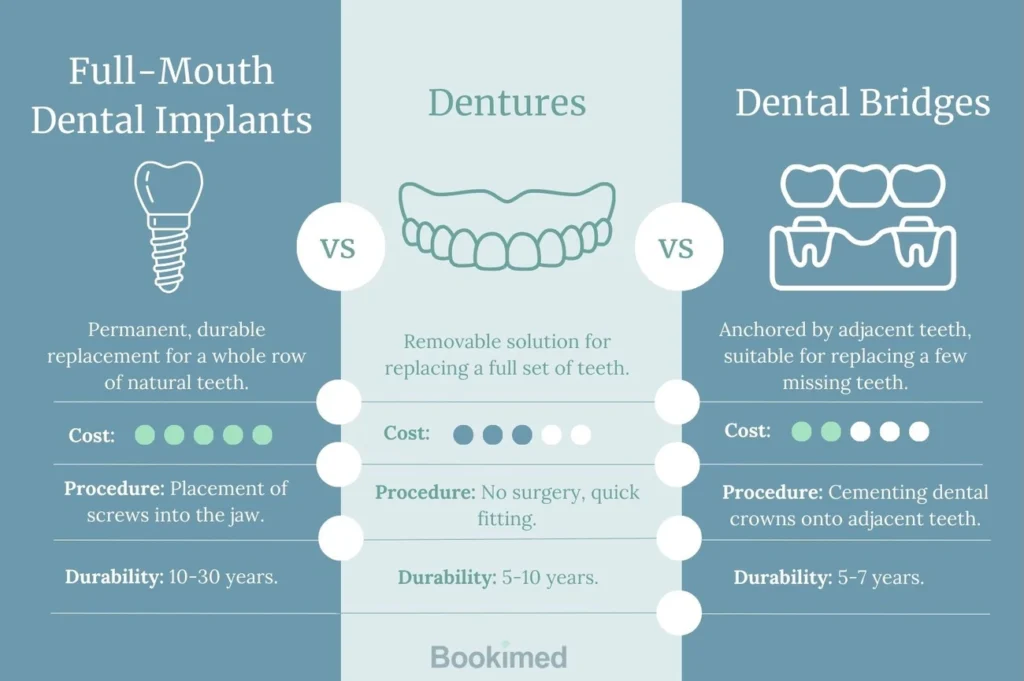Dental implants cost a lot more than other tooth replacement options. A single tooth implant in the United States ranges from $1,500 to $6,000. The prices change based on the implant type and where you live.
The national average for a single tooth dental implant stands at $2,143. This amount can reach up to $4,157 in certain cases. Patients who need more extensive dental work face higher costs. Full mouth dental implants typically cost between $15,000 and $30,000+ per arch. Texas patients looking at All-on-4 treatment should expect to pay around $23,508 per arch. This piece explains what affects these prices and compares dental implant costs with other options. Understanding these costs helps you make smart choices about your dental health investment, whether you need one tooth replaced or a full mouth restoration.
Understanding Dental Implants and Their Components
Image Source: Shutterstock
Dental implants replace missing teeth permanently by working just like natural teeth’s roots and visible portions. These biocompatible devices give patients a long-term solution that works better than temporary fixes, with success rates reaching over 95% across 10-year periods.
What is a dental implant?
A dental implant is a small metal post that dentists surgically place in your jawbone to replace a missing tooth root. Most implants use titanium—a metal that works well with the human body. Your jaw anchors these posts through a biological process called osseointegration. The healing takes between four and six months. During this time, the implant bonds with your bone tissue to create a strong base for artificial teeth.
Implant, abutment, and crown explained
Your complete dental implant system has three main parts that function together:
- The implant post – This screw-like piece acts as your new tooth root when placed in the jawbone. The post measures about 18mm long, and this length gives it remarkable strength and stability.
- The abutment – After healing finishes, this connector attaches to the implant and rises just above your gums. It looks like a short tooth and supports your final restoration.
- The crown – This visible part matches your natural teeth’s shape, size, and color. Dentists make crowns from strong materials like porcelain or zirconia and attach them to the abutment with dental cement or screws.
Why implants are different from other options
Dental implants outperform traditional tooth replacement methods in several ways:
Your jawbone stays healthy with implants because they stimulate bone growth, which prevents deterioration after tooth loss. Dentures and bridges can’t provide this vital benefit.
These implants work on their own without damaging nearby healthy teeth. Traditional bridges need support from neighboring teeth, which must be ground down.
The implants stay firmly in place and won’t move when you speak or eat, unlike dentures. You can eat whatever you want with complete confidence.
Cost Breakdown: Single Tooth vs Full Mouth Implants in 2025
Image Source: The Dental Implant Place
Understanding the financial investment plays a significant role in tooth replacement planning. Dental implant costs in 2025 depend on treatment complexity, materials, and location.
Average cost of a single tooth implant
A complete single tooth implant package costs between $3,000 and $5,000. The detailed fee typically has:
- Original consultation: $100-$200
- Implant placement surgery: $1,500-$2,000
- Abutment placement: $300-$500
- Crown placement: $1,000-$2,000
The final price often increases with extra procedures. Bone grafting costs $500-$3,000, sinus lifts range from $1,500-$5,000, and diagnostic imaging runs $25-$250.
Full mouth dental implants: All-on-4, Snap-in, Zirconia
Patients needing extensive restoration can choose from several options:
All-on-4 implants range between $24,000 and $30,000 for a full mouth ($12,000-$15,000 per arch). This technique supports a full arch of teeth using four strategically placed implants.
Snap-in dentures cost $3,000 to $12,000 per arch. These removable prosthetics connect to implants through special attachments. They provide better stability than traditional dentures while remaining more affordable than fixed options.
Zirconia full arch bridges stand as the premium choice at $20,000 to $50,000+ per arch. Zirconia’s strength, esthetics, and durability make it a superior option compared to acrylic alternatives.
Cost comparison table by type
| Implant Type | Per Tooth Cost | Full Arch Cost | Full Mouth Cost |
| Single Tooth | $3,000-$5,000 | N/A | N/A |
| All-on-4 | N/A | $12,000-$15,000 | $24,000-$30,000 |
| Snap-in Dentures | N/A | $3,000-$12,000 | $6,000-$24,000 |
| Zirconia | $3,500-$5,100 | $20,000-$50,000+ | $40,000-$100,000+ |
Regional price variations in the U.S.
Geographic location significantly affects dental implant costs. Urban areas charge 15-25% more than suburban locations. Market data shows:
- West Coast (Seattle, San Francisco, Los Angeles) prices range from $3,000-$4,500 per tooth
- Midwest and Southern regions cost 10-15% less at $2,700-$3,800 per tooth
- Urban areas average $3,000-$4,500 per implant, while rural areas cost $2,500-$3,500
Hawaii leads with the highest implant costs at $3,565, followed by Massachusetts ($2,781) and California ($2,730). More affordable options exist in Alabama ($1,790), Oklahoma ($1,806), and Arkansas ($1,825).
Key Factors That Influence Dental Implant Cost
Image Source: hellodent
Your final dental implant cost depends on several key factors beyond the simple procedure itself.
Material used: Titanium vs Zirconia
The choice of implant material plays a big role in both cost and performance. Titanium implants typically cost between $1,500 and $3,000, making them easier on your wallet. Zirconia implants get pricey at about double the cost—ranging from $3,000 to $6,000. People choose zirconia mainly for looks, and it does look better for front teeth.
Bone grafts, sinus lifts, and extractions
The overall expenses can climb high with preparatory procedures. If your jawbone isn’t dense enough, bone grafting costs between $600 and $2,600. Sinus lifts are another consideration, with prices from $440 to $2,600. These extra procedures are crucial for successful implant placement and add to your total investment.
One office vs multiple providers
Getting treatment at one location can speed up the implant process by about 8 weeks compared to visiting multiple places. This approach saves you roughly 5% on dental implant costs before any extra fees. You’ll also avoid the hassle of coordinating between different specialists.
Experience of the dentist or surgeon
The price varies based on your dentist’s expertise:
- Entry-level surgeons: $1,500-$2,000 per implant
- Intermediate experience: $2,000-$2,500
- Highly experienced: $2,500-$3,000
Experienced specialists might charge more, but they help you avoid costly complications down the road.
Use of CT scans vs X-rays
Better imaging technology leads to better outcomes. CT scans give a complete 3D view of your jaw, showing bone shape, amount, and condition. About 49% of dental offices that do implants offer CT scans, which cost between $300 and $1,000. X-rays are cheaper ($50-$200) but only show flat views.
Temporary same-day teeth and lab work
Temporary prosthetics cover exposed posts right after implant surgery during healing. About 45% of practices don’t offer this service. The ones that do—about 90-94%—charge extra, anywhere from hundreds to thousands of dollars.
Insurance, Financing, and Alternatives to Implants
Image Source: ISU Armac
Many patients ask about payment options for dental implants because out-of-pocket expenses can be high. Budget-friendly solutions help make this investment more available.
Does dental insurance cover implants?
Dental plans have changed their implant coverage over the last several years. Most plans now offer partial coverage for implants. Coverage ranges from 40-50% of procedure costs. Notwithstanding that, coverage details vary by a lot between providers. Some plans exclude pre-existing conditions and require waiting periods up to 12 months. Some Medicare Advantage plans might help with coverage. Patients should read their policy’s Summary of Benefits carefully. This becomes especially important when dealing with missing tooth clauses and maximum annual limits.
Financing options and payment plans
Patients without enough insurance coverage have several financing choices:
- Medical credit cards like CareCredit are a great way to get special financing with zero-interest options
- Health Savings Accounts (HSAs) and Flexible Spending Accounts (FSAs) let you use pre-tax dollars
- Personal loans with APRs ranging from 3.99% to 30.99%
- Dental practice payment plans spread costs over 1-2 years
Dental bridges and dentures: pros and cons
Traditional alternatives to implants include:
Dental Bridges
- Advantages: Insurance usually covers them; you don’t need invasive surgery
- Disadvantages: You need replacement every 5-7 years; they might damage nearby teeth
Dentures
- Advantages: More affordable at first ($600-$2,500 per arch)
- Disadvantages: Less stable; need replacement every 5-8 years
Cost over time: implants vs alternatives
The original cost of implants runs higher. Looking at long-term expenses tells a different story. Implants might cost $3,000-$5,000 at first, but their lifetime maintenance costs stay low. Dentures cost $1,000-$4,000 but need replacements, adjustments, and special products. The total cost over 15 years can reach $7,150-$13,150. Bridges also need replacement, and 15-year costs can hit $4,500-$13,000.
Conclusion
Dental implants are a big financial investment compared to other tooth replacement options. Single tooth implants generally cost between $3,000 and $5,000. Full mouth restorations can range from $24,000 to over $100,000 based on materials and techniques. The price tag might seem steep at first, but there’s more to think about than just the original cost.
These implants offer great value over time. Bridges and dentures need replacement every 5-8 years. Implants can last decades if you take care of them, which makes them an economical solution in the long run. On top of that, they keep your jawbone healthy and protect nearby teeth – benefits you won’t get with other options.
Your choice of materials affects both cost and results by a lot. Titanium is easier on your wallet at $1,500-$3,000. Zirconia implants cost about twice as much but look better for visible teeth. Your dentist’s experience relates to pricing too. Skilled specialists help you avoid problems that could get pricey later.
Where you live is a vital factor in final costs. People on the West Coast pay premium rates ($3,000-$4,500 per tooth). The Midwest and South offer better deals – about 10-15% lower. These regional differences should shape your budget planning.
Dental insurance has gotten better over the last several years, but most plans only cover 40-50% of the costs with some limits. The good news? You have many payment options. Medical credit cards, HSAs, FSAs, personal loans, and dental office payment plans are all ways to manage the cost.
If you need to replace teeth, take time to look at all these pieces – costs, long-term benefits, insurance, and payment choices. With the right information, you can pick a solution that works for your dental health, lifestyle priorities, and budget.
FAQs
Q1. What is the average cost of a full mouth dental implant procedure? The cost of full mouth dental implants typically ranges from $24,000 to $100,000+, depending on factors such as the type of implants used, materials chosen, and any additional procedures required.
Q2. How much does a single tooth implant usually cost? A single tooth implant generally costs between $3,000 and $5,000. This price typically includes the implant, abutment, and crown, but may vary based on location and specific patient needs.
Q3. Are dental implants covered by insurance? Many dental insurance plans now offer partial coverage for implants, typically ranging from 40-50% of procedure costs. However, coverage details vary significantly between providers, and some plans may have waiting periods or exclusions.
Q4. What factors influence the cost of dental implants? Key factors affecting implant costs include the material used (titanium vs. zirconia), need for additional procedures like bone grafts, practitioner experience, imaging technology used, and geographic location.
Q5. How do dental implants compare to alternatives in terms of long-term costs? While dental implants have a higher upfront cost, they often prove more economical over time. Implants can last decades with proper care, whereas alternatives like dentures or bridges typically require replacement every 5-8 years, potentially resulting in higher long-term expenses.


